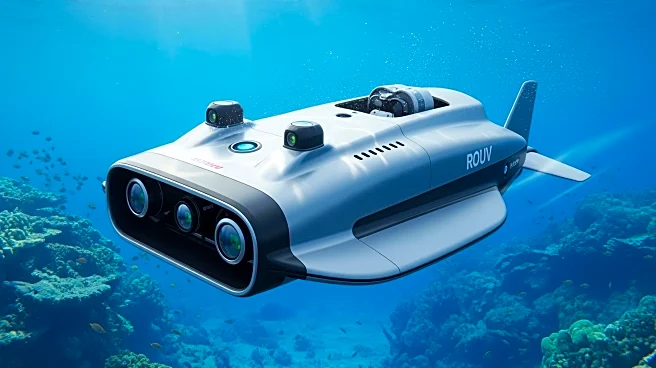What's Happening?
A new initiative is underway to deploy advanced Remotely Operated Underwater Vehicles (ROUVs) in the Suez Canal by June 2023. The project aims to test smart technology advancements in ROUVs to improve
navigation in the canal's narrow lanes. This effort involves collaboration with various institutions to explore the use of cutting-edge sensor technology, artificial intelligence, and autonomous systems. The focus is on enhancing the ROUV's ability to navigate and understand the aquatic environment, considering factors like climate change impacts. The initiative includes a comprehensive technology review and risk assessment to address operational challenges and improve safety.
Why It's Important?
The Suez Canal is a vital artery for global maritime trade, and improving navigation through smart technology can significantly enhance efficiency and safety. The deployment of advanced ROUVs could reduce the risk of groundings and improve the management of shipping lanes, which is crucial given the canal's historical challenges with navigation. The integration of AI and sensor technology in ROUVs represents a significant step forward in maritime operations, potentially setting new standards for underwater vehicle capabilities. This development could benefit industries reliant on maritime trade by ensuring smoother and safer passage through one of the world's busiest canals.
What's Next?
The project will proceed with testing and validation of the ROUV technology in the Suez Canal. Stakeholders, including maritime authorities and technology developers, will closely monitor the outcomes to assess the effectiveness of these advancements. Successful implementation could lead to broader adoption of smart ROUV technology in other critical waterways, influencing future maritime navigation standards. Continued collaboration among international research institutions and industry leaders will be essential to refine and expand the capabilities of ROUVs.
Beyond the Headlines
The use of smart ROUVs in the Suez Canal highlights the growing importance of integrating technology with environmental considerations in maritime operations. As climate change continues to affect global waterways, the ability to adapt and innovate with technology becomes increasingly crucial. This initiative may also spur further research into sustainable and efficient maritime practices, potentially influencing policy and regulatory frameworks in the shipping industry.










